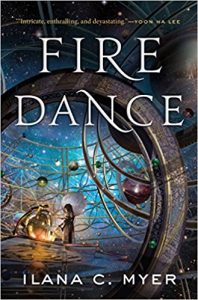Liz Bourke Reviews Fire Dance by Ilana C. Myer
 Fire Dance, Ilana C. Myer (Tor 978-0-7653- 7832-3, $27.99, 368pp, hc) April 2018. Cover by Stephan Martinière.
Fire Dance, Ilana C. Myer (Tor 978-0-7653- 7832-3, $27.99, 368pp, hc) April 2018. Cover by Stephan Martinière.
I’m still not sure how I feel about Ilana C. Myer’s Fire Dance. Myer’s first novel, Last Song Before Night, left me feeling a little distant and disengaged from its action and characters. Fire Dance is its sequel, set a handful of months later. It has a few changes among its viewpoint characters and enjoys a much more political emphasis than its predecessor. Last Song Before Night presented a variation on the fairly standard epic fantasy “restore magic to the realm” quest – a well-written variation, with interesting characters and several novel elements, but a variation on an old standard nonetheless. But Fire Dance approaches the much more novel question of what happens after that magic is restored: the consequences, political and personal, that arise from the change.
Fire Dance opens with a death. One of the Archmasters on Academy Isle, where young men (traditionally, though now there’s a woman or two) are taught to be poets, has died. We witness happenings on the Isle through the eyes of teenager Julien Imara, one of the handful of young women who has chosen to brave the unwelcomingly masculine provinces of the Isle in order to learn to be a poet and a seer; and through the eyes of Dorn Arrin, a young man near the end of his course of study who doesn’t like the changes brought about by the return of magic, who sees in them the end of the old ways of being a poet – the ways of being a poet that he believes in and wanted for himself. The ultimate significance of the Archmaster’s death only slowly becomes clear, as it turns out that his replacement is a man of vast ambition and willingness to use magic for self-aggrandising ends, and to use means that include mass murder.
In the capital, Tamryllin, we encounter Lin Amaristoth, Court Poet, at the centre of a nexus of politics and connections. Lin is dying, as a result of her choices in Last Song Before Night: the unavoidable consequence of an encounter with a dead man whose memories she now shares. When her homeland’s traditional (and much more militarily powerful) allies request help with a mystical problem, she agrees to go. The Fire Dancers – mysterious practitioners of strange magics – are conducting attacks on villages in Kahishi, attacks that leave almost everyone dead, where the attackers dissolve if they are killed and disappear entirely (as if by magic) by morning.
In Kahishi, Lin finds herself in the middle of court politics. King Eldakar’s court is a restless place, with unease over his choice of bride – Rihab Bet-Sorr, an alleged former slave girl, with whom he is in love – and rivalries between the wizards of the Tower of Glass, who so far have been unable to do more than predict – just about in time – the attacks of the Fire Dancers. Lin finds a friend and a lover in Zahir, the First Wizard of the Tower of Glass, but not everything in Kahishi is as it seems. Lin only has a limited amount of time to find the truth about the Fire Dancers’ attacks, and her own time is running out.
The two threads of the novel, on Academy Isle and in Kahishi, seem separate, but slowly, gradually, it becomes plain that they are linked. Political and mystical connections join the claustrophobic, bullying intrigues of the Isle to the murderous slaughter and court manoeuvrings in Kahishi. Fire Dance ends with matters unresolved, wanting another volume to work through the consequences….
This is a book about consequences begetting consequences, and how small choices and personal decisions – human interaction, falling in love, becoming friends, falling out of friendship, the choice to be loyal or to betray – can have much larger results than anyone anticipated. The politics of nations turn on the personal relationships of people.
Myer’s prose is precise and descriptive, rising at times to elegantly soaring. Her pacing is measured: the narrative style recollects to me Melanie Rawn’s Ruins of Ambrai, which I read as a much younger human, or Janny Wurts’s novels. Fire Dance, like Last Song Before Night, recollects a more traditional mode of fantasy than is currently widespread: high fantasy with a somewhat distanced voice and a more restrained narrative than the banter-heavy approach, or the grim reliance on brutality and shock value of many recent works.
This distanced voice, though, makes it at times hard to connect with Myer’s characters. They’re interesting people, with interesting problems and nuanced approaches to the world – Julien is a very believable teenager, Dorn Arrin entirely a young man who thinks he knows more than he actually does, Lin complex in her maturity and determination and occasional poor life choices – but for whatever reason, I find it hard to find them actively engaging. Maybe it’s because Fire Dance, although it’s not what you might call grim, is serious all the way through: it doesn’t have much in the way of lighter moments, and humour is hard to come by. It’s a good book, well-written and well put together, but I’m still not sure how much I actually liked it.
Liz Bourke is a cranky queer person who reads books. She holds a Ph.D in Classics from Trinity College, Dublin. Her first book, Sleeping With Monsters, a collection of reviews and criticism, is out now from Aqueduct Press. Find her at her blog, her Patreon, or Twitter. She supports the work of the Irish Refugee Council and the Abortion Rights Campaign.
This review and more like it in the July 2018 issue of Locus.
 While you are here, please take a moment to support Locus with a one-time or recurring donation. We rely on reader donations to keep the magazine and site going, and would like to keep the site paywall free, but WE NEED YOUR FINANCIAL SUPPORT to continue quality coverage of the science fiction and fantasy field.
While you are here, please take a moment to support Locus with a one-time or recurring donation. We rely on reader donations to keep the magazine and site going, and would like to keep the site paywall free, but WE NEED YOUR FINANCIAL SUPPORT to continue quality coverage of the science fiction and fantasy field.







